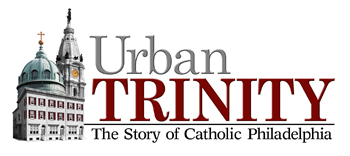 The history of the Catholic Church in the Philadelphia region is coming to the small screen this week.
The history of the Catholic Church in the Philadelphia region is coming to the small screen this week.
Viewers throughout the Philadelphia media market can see the first part of “Urban Trinity: the Story of Catholic Philadelphia” starting at 7 p.m. Tuesday, Sept. 22, on 6 ABC, Channel 6. Part two of the three-part series follows at 7:30.
The series concludes at midnight on Sunday, Sept. 27, as Pope Francis’ plane carries him home to Rome after his historic visit to Philadelphia and the United States.
[hotblock]
The entire film will premier as part of the World Meeting of Families Film Festival at 8 p.m. Wednesday, Sept. 23 at Perelman Theater at the Kimmel Center in Philadelphia. The film will also be available online beginning Sept. 28 at urbantrinityfilm.com.
“Urban Trinity” explores Philadelphia’s history “through the lens of the many Catholic immigrants who shaped and changed the city,” said Sam Katz, the film’s producer and founder of History Making Productions, the Philadelphia-based studio that created “Urban Trinity.”
The film examines the unique story of Catholics in Philadelphia as a case-study of the Catholic experience in America.
“Urban Trinity” features 18th and 19th century reenactment scenes filmed on location in local parishes, such as St. Philip Neri, St. Stanislaus and other historical locations, capturing Catholic sacred architecture throughout the Greater Philadelphia region.
A broad cross-section of regional and national scholars, clergy and notable personalities provide comprehensive insight and scholarly expertise on Philadelphia’s Catholic history, including Kathy Cummings, John McGreevy and Jay Dolan of Notre Dame University, Rodger Van Allen of Villanova, Jennifer Nacarelli of Delaware, Robert Orsi of Northwestern, Jesuit Father Dan Joyce and Randall Miller of St. Joseph’s University, Margaret McGuiness of La Salle and Chris Matthews, Mercy Sister Mary Scullion, Fran Dunphy, Sonny Hill, local author Cordelia Biddle and many others.
Kate Oxx, a producer of the series and assistant professor of religious studies at St. Joseph’s University, said the documentary is revolutionary in its approach.
“No city has ever produced a film about its Catholic people. “Urban Trinity: The Story of Catholic Philadelphia” contextualizes the contemporary challenges and opportunities of American Catholics within a historical framework of defense, pressure, assimilation and diversity.”
The first part of the series follows the adversity and struggles faced by early Catholics trying to practice their faith in the privacy of their homes and in the area’s earliest Catholic churches. The fight to participate in church decisions led to a schism within the young diocese. The Trustees’ dispute saw parishioners conflicting with newly arrived 19th century bishops in aclashforcontrol of the parishes.Later, demands that Catholic children be allowed to read and study their Bibles in schoolsinfuriated Philadelphia’sProtestants,sparkingoneofthemostviolentriotsinurbanAmericanhistory.
Part two examines the boom of Catholicism in Philadelphia and the influence that the great waves of European immigrants — Irish, German, Italian and Polish — had on the Catholic Church and the city during the late 19th and early 20th centuries. Thefirstethnicandnationalparishesinthecountrywereformedin Philadelphia, supported by the first and most extensive diocesan school system in America.
The segment charts Philadelphia’s 20th century transition from a Protestant city to a Catholic one, with the founding of Catholic institutions including hospitals, a seminary, convents, social service agencies, colleges and universities, in addition to the work of Catholic Philadelphians such as Francis Kenrick, John Neumann, Katherine Drexel and numerous religious orders and lay leaders.
[hotblock2]
The final chapter chronicles the rise of Catholics to prominence in business, labor, social justice movements, sports and politics, as well as the fraying of the cocoon that had once knit them together. Despite the tremendous infrastructure investments led by Dennis Cardinal Dougherty to accommodate Philadelphia’s growing Catholic community, the post-World War II period saw de-industrialization, demographic changes, schisms over social and moral issues, financial distress and the child sexual abuse scandal, all contributing to an exodus of the faithful in the archdiocese.
Today, new immigrants — from Latin America, Asia and Africa — challenge and inspire Catholic Philadelphia as their predecessors did. Archdiocesan leadership now seeks to reassert the relevance, value and centrality of the church following the World Meeting of Families and Pope Francis’ much-anticipated visit.
“The lesson for today,” said Katz, “is that if you think about people who bring different customs, language, religion or culture as a threat to the status quo and your reaction is ‘let’s get them out of here or kill them,’ then you will be cutting off a very important part of your future. The story of Catholic Philadelphia vividly portrays the risks and rewards of learning that lesson.”
The film was produced at a cost of $1 million and its major funders include the Connelly Foundation, Independence Blue Cross, the Raskob Foundation, the American Catholic Historical Society, the Henkels Family Foundation and the Commonwealth of Pennsylvania’s Film Tax Credit Program. Approximately 65 percent of the film’s funding has been provided from private individuals and foundation sources.
Educational resources enabling teachers and their students to use the film in the classroom will be available on the Urban Trinity website.
PREVIOUS: Thanks to financial aid, 480 more couples to attend World Meeting
NEXT: Volunteers ready to go for World Meeting



Share this story